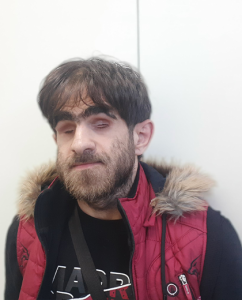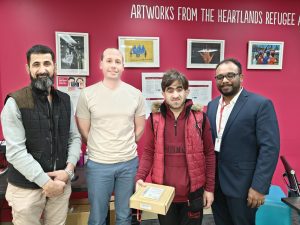Disabled refugee’s courage shines through
When Syrian refugee Mahmoud Alsayad arrived in Australia last month he was escaping the conflict and strife in his homeland.
But he was also escaping sub-human treatment as a blind person.
Ashamed of his disability, Mahmoud’s family made him sleep in a store cupboard; he was not allowed out to go shopping or visiting and he was beaten when he talked about leaving.
He often went hungry for days because of irregular support and caring arrangements.
And Mahmoud’s dreams of study, and building a future and having a family were scoffed at by his family.
But after arriving in Melbourne as a refugee, with the support of refugee settlement agency AMES Australia and the NDIS, he has set about creating a life he could never have achieved at home.
 Mahmoud was born in Aleppo, in north-west Syria, with congenital blindness.
Mahmoud was born in Aleppo, in north-west Syria, with congenital blindness.
Because of his disability, he struggled at school and it was not until he was much older that he was able to attend a specialist school for vision impaired children.
“My parents didn’t know about the school so I didn’t attend until I was much older,” he said.
Mahmoud says that because of his disability, his life was strictly controlled by his family.
”I could not go out. I was expected to just stay home and do nothing. As I got older I started to feel sorry for myself,” he said
“My family would not let me do anything. They thought that I was helpless and I could not do anything for myself. I was effectively a prisoner of my family.”
And when civil war erupted in Syria in 2012 things got worse for Mahmoud.
“It was very scary and I was always stressed. Because I couldn’t see, it was hard to know what was going on so it was scary,” he said.
As the conflict escalated, Mahmoud and his family fled their home in Aleppo as the city was besieged and largely destroyed by government forces in a conflict that became known as ‘Syria’s Stalingrad’.
Mahmoud and his family moved from city to city seeking refuge until in 2016, when they made an arduous and risky 12 hour trek into Turkey. Crossing rivers and passing through remote farms, they eventually found a hiding place in a small village.
“We ran away from Syria because of the war and went to Turkey as illegal immigrants. When the Turkish authorities found us they gave us ID documents,” Mahmoud said.
“Then we had some level of safety and we were able to go and stay with my brothers, who had already been in Turkey for four months.”
But in Turkey, Mahmoud was not eligible for services and support he needed. His family received financial support from the International Organisation for Migration (IOM) although it was barely enough to live on.
Mahmoud’s brothers were able to find work in construction which meant his family could feed itself.
But he became increasingly isolated.
“I was by myself. My family would put me in a room and leave me. Unfortunately my family didn’t want me to do anything for myself; to study or work or go out to places. They saw my life as just eating, drinking and sleeping.
“They told me that people who were normal and not disabled were not able to do the things I wanted to do. ‘How can you do this’, they said.”
“Sometimes I wanted to go shopping for clothes but no one would take me. My family felt ashamed to be walking with me in public because of my disability. My family did not think of me as a human being,” Mahmoud said.
As things came to a head, Mahmoud started to hide his intentions from his family.
Secretly, with the help of an uncle, he applied for a visa to come to Australia where he thought he would be able to lead a full, independent life.
“I did not tell my family I had applied for a visa and it took three years to be approved.
“I was tired of being treated as a non-human. I wanted to get out of that storage room and study and work and build a future.”
Mahmoud was granted a subclass 202 visa, which is for people who face substantial discrimination or human rights abuses.
“When the visa came through, I didn’t accept straight away. I was unsure about what to do. I didn’t know what life would be like in Australia but it could not be worse than the life I was living,” he said.
Mahmoud did some research on Australia using an app on his phone and he learned about services for the blind and the NDIS.
“When I left Turkey I was stressed and struggling, thinking about what my life would be like,” he said.
“But everyone who has supported me has been fantastic. The IOM people in Turkey who put me on the plane were really kind.
“And everyone in Australia has been amazing to me. In comparison, my family did nothing for me.”
Upon arrival, Mahmoud became a client of AMES Australia which referred him to NDIS provider New Ability Services.
Having no friends or family in Australia, he is now living supported accommodation.
 The 28-year-old was assigned a NDIS care worker Habib Alsaidie, who acts as guide, translator and friend.
The 28-year-old was assigned a NDIS care worker Habib Alsaidie, who acts as guide, translator and friend.
“Habib has done an amazing job for me. He is like a brother. I want to thank everyone who has supported me. Eman and Anthony from AMES, Habib and everyone at New Ability Services,” Mahmoud said.
“I am happy now. I appreciate everything that has been done for me and I want to become independent so I can give back,” he said.
Mahmoud said becoming independent was a major factor in his decision to come to Australia.
“I came to Australia because I need to be independent. I want to learn English, study and work. I want to have a family and build a future,” he said.
Mahmoud hopes to be reunited with and marry his girlfriend Ana whom has been resettled in Germany with her family.
His first weeks in Australia have been made easier by the gift of an iPhone by Australian technology company MOORUP.
The iPhone has a number of vision accessibility features that allow Mahmoud to operate the phone simply by using his voice. This means he can use the mobile to text, call and connect with others.
Habib is one of an increasing number of refugees with a disability arriving in Australia.
In 2023 so far, AMES has welcomed about a dozen newly arrived refugees with a disability, an increase on previous years.
AMES Manager Operations and Practice Anthony Ferretto said refugees and migrants can experience very poor treatment and limited access to services in their home countries before arriving to Australia.
“They are understandably nervous about how their settlement experience in Australia will be. But health reports prior to arrival give us the ability to prepare for on arrival health and wellbeing needs,” Anthony said.
“In Mahmoud’s case, we approached the Department of Home Affairs for additional funding to support Mahmoud’s accommodation and personal care needs.
“We were able to engage an NDIS provider with supported accommodation for Mahmoud, with a live-in carer who speaks the same language as Mahmoud. With the carer’s support, Mahmoud is able to eat, socialise and access essential services in the local community.
“We are seeing a really positive result of this planning,” he said












